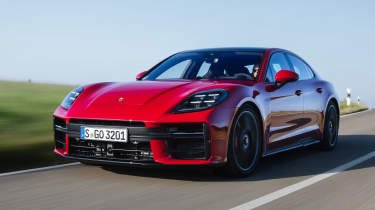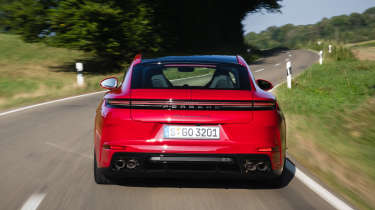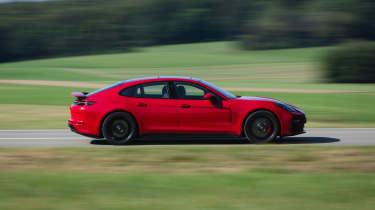Porsche Panamera GTS 2024 review – a pure-V8 alternative to BMW’s hybrid M5?
Porsche’s Panamera has been given the GTS treatment, with a retuned chassis, a twin-turbo V8 and no electric motors in sight. Should BMW M be worried?
Could the Porsche Panamera GTS be the supersaloon for those who want something less technical, more traditional than the new BMW M5? The M5 has morphed into a 2.5 ton, 717bhp hybrid powerhouse in G90 form, and while it's devastatingly capable and remarkably agile, its blown up proportions and added complexity are a big departure from what has come before – as many are keen to shout about on the internet.
The Panamera is comparatively old school. Propulsion is by a V8 alone, it’s nearly half a ton lighter than the M5 and it puts out a healthy but not absurd 493bhp. The question is, does this recipe result in a purer, more compelling supersaloon, or is the GTS outgunned and outsmarted by the latest from BMW M and Mercedes-AMG?
The GTS is more about driving feel and sensations than it is outright power – Porsche will point you towards the 760bhp Panamera Turbo S E-Hybrid if you want the latter – and it comes with bespoke chassis tuning and choice options to deliver on that brief. Rather than the clever Active Ride suspension you get as standard on the Turbo S E-Hybrid, the GTS comes with conventional adaptive dampers and two-chamber air springs, set 10mm lower than standard with a sportier calibration. Reinforced anti-roll bars have been fitted, too, as well as an electronically controlled PTV Plus (Porsche Torque Vectoring) rear diff. The changes are said to make the Panamera more agile and dynamic without ruining its daily usability.
More reviews
In-depth reviews
Long term tests
Reviews
The GTS’s cabin is dark, moody and cocooning, with Race-Tex suede trim covering the headlining, seats and steering wheel. This latest-gen model is less cluttered than its predecessor, without the pistol-grip gear selector sprouting from the centre console (it’s been replaced by a switch next to the steering wheel), but it does feel a little plain as a result, with masses of gloss black trim and not much in the way of sumptuous detailing. The new climate control vents, meanwhile, are a bit of a disaster. With bulky plastic shrouds they’re uglier than before, and their direction can only be adjusted via a menu in the central touchscreen, as in the Taycan.
A higher bonnet line means the Panamera feels more substantial than Porsche’s electric saloon from the cockpit, despite the two having a similar footprint on the road. The driving position is good, though, the small-diameter wheel extending out to meet you and the 18-way Adaptive Sports seats pinching you around the ribs to keep you in place.
The 4-litre twin-turbo V8 flexes through its mid-range with a rumbly, bassy note from the exhaust (some of which sounds like it’s being augmented by the speakers, it must be said). With no hybrid system to fill torque holes, there’s a momentary hesitation if you get hard on the throttle at low revs, but the motor hits its stride above 2000rpm and response sharpens up when you extend it to the upper reaches. The Panamera doesn’t explode forward when you do so, however, with a linear, forceful pull that might feel a little weak if you’ve just stepped out of an M5 – or even an M3.
By usual standards this is a fast car, make no mistake (0-62mph in 3.8sec, 188mph flat out), but there’s a sense that performance has been left on the table to make room for other models in the range. Which is fine, until you realise the GTS costs around £10k more than an M5 at £125,600, and that the 4S E-Hybrid makes more power for £23k less. An extra 80bhp or so wouldn’t have hurt.
With four-wheel drive and mammoth 325-section rear tyres, the GTS has no trouble converting its 487lb ft of torque into forward motion, and even with the ESC switched off its neutral and secure. Perhaps too secure, because to break through the Panamera’s inherent stability you need to really lean on it, committing to the throttle early to get the PTV diff working and overdriving the outside rear tyre. At most you’ll need a flick of correction at the wheel, and there isn’t the endless throttle adjustability of an M or AMG product.
But with a neater style, you start to appreciate the subtleties in the way the GTS drives, and how effective it can be from point to point. It stays composed and keyed in under high braking and cornering forces (particularly in the Sport damper setting – Sport Plus is too tense for the road), and breakaway at both axles is progressive and easy to read. It always feels like a big, substantial car, but the clean and accurate steering response means you can pick precise lines and build confidence for corner after corner. You need to work the paddles of the eight-speed PDK ‘box to punch away from them, but it’s easy to settle into a fast, satisfying flow in the GTS.
Dial everything back to Comfort and it becomes a fluid, easy car to cover miles in, too. The wide tyres do kick up some surface noise but there’s compliance to the damping, and a locked-on reassurance from the steering at speed. The response from the brakes isn’t as intuitive, however, with a lightness on initial travel when you brush the pedal to check your speed.
It’s hard to pick holes in the Panamera GTS. It has the duality a great supersaloon needs, and there’s depth and nuance to how it dissects a road. But for the money we can’t help but feel that its performance should have been turned up a few clicks more – maybe not to M5 levels, but enough to give the driving experience a bit more energy and distinction over lesser Panameras. It’s not the most expressive supersaloon to drive either, and just a little more bite and adjustability would add more layers to what is pitched as the most driver-centric Panamera. In these respects, the GTS feels like a bit of a missed opportunity, even though it’s a highly competent saloon in its own right.
Price and rivals
The Panamera GTS lives in a world of massively powerful, hybrid-powered supersaloons like the BMW M5 and Mercedes-AMG E53, and while the Porsche appeals in its relative simplicity, these new-age rivals offer more for your money in raw performance terms. For the £125,600 it costs to get into a GTS, you can order a new, 717bhp M5 with around £10k to spare for options. The E53, meanwhile, offers similar performance to the Porsche but for a substantially cheaper £90,860 asking price in its base form.
Audi’s RS7 Performance is another option that trades electrification for pure V8 power (its engine is related to the Panamera’s, incidentally), but delivers a full-blooded 621bhp supersaloon experience for almost £10k less.





